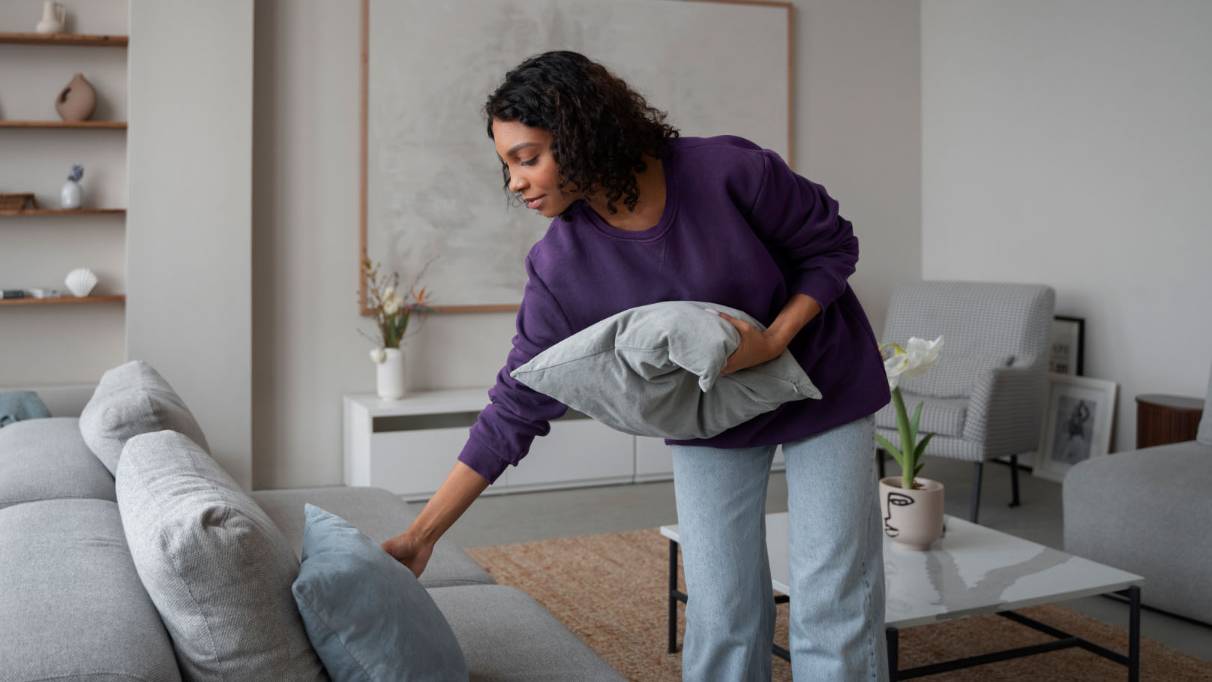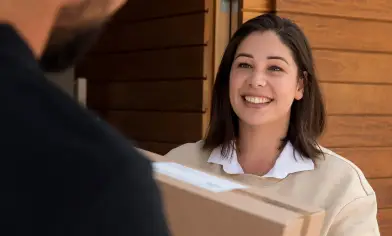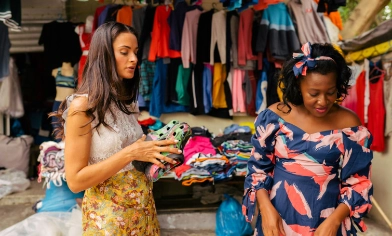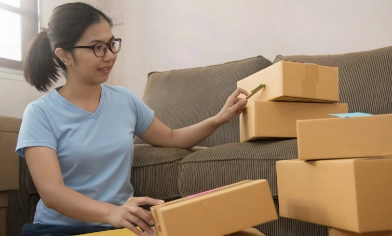Surrounded by stuff?
If your living space is feeling a little chaotic or you simply want to create a more organised home, decluttering can make a big difference. And it’s more than simply tidying up. It’s about making your home feel calm, comfortable and more ‘you’.
Decluttering could help you:
- Create a more relaxing space: A tidy, clutter-free space can help make your home feel much more welcoming and even lower stress levels
- Rediscover forgotten treasures: Whether it’s a long-lost jumper, a tenner tucked away in an old wallet or homeware you never quite found the right spot for, decluttering could mean stumbling across things you’d forgotten about
- Make some extra cash: Selling your unwanted items online could help give your bank balance a boost
- Give back to others: Donating things you no longer need can help them find a new home with someone who needs them
- Do your bit for the planet: Recycling, repurposing or rehoming items helps reduce waste and keep things out of landfill
Ready to get started? Here are some simple tips to help you clear the clutter and create a space that you love.
1. Start small
Decluttering doesn’t have to be overwhelming. Take it one room at a time and smart small with a drawer or cupboard, before moving onto the next thing. You could even set aside some time each day, like 15 or 30 minutes, to make decluttering part of your everyday routine. This approach can help you tackle specific areas faster than waiting for the right time to do it all at once.
If you are decluttering an entire room at once, make sure you give yourself plenty of breaks. If not, you could find yourself rushing the process and keeping items you might not necessarily need or use. Or you might even get rid of things that you’ll miss later.
Finally, make this time enjoyable. Put on a playlist or podcast to help make decluttering something that you look forward to, rather than a chore.
2. Ask yourself these questions
Can’t decide what to keep and what to get rid of? Thankfully, there are a few simple questions you can ask yourself while you sort through your things:
- Do I use this item often? If it’s been gathering dust for weeks, months or even years, then it could be time to say goodbye
- Will I really need this in the future? Be honest – does it really serve a purpose or are you hanging on to it “just in case”?
- Does this have sentimental value? It’s okay to keep things that mean a lot to you but be selective. A few special items can be more meaningful than piles of stuff
- Do I have more than one of these? If you’ve got a stash of similar items, like 15 winter jumpers for example, ask yourself whether you really need them all
Questions like this can help you reflect on what you truly need in your home. It moves the focus from “getting rid of stuff” to understanding what adds value to your life, allowing you to declutter with purpose.
3. Use four piles to sort your items
Next, sort your items into four piles so you can easily see what you want and don’t want to keep:
- Keep: Items you need, use often or that are special to you
- Sell: Things in good condition that others might buy
- Donate: Items that others can use but aren’t worth selling
- Recycle or dispose: Broken or worn-out items
Use boxes or bags to separate the items, and deal with each pile as soon as possible. Whether it’s selling, donating or disposing, sorting out your stuff quickly will help you stay on track.
4. Organise the items you keep
Once you’ve decided what you want to keep, it’s a good idea to organise things in a way that stops clutter from creeping back in.
Here are some ideas:
- Keep everyday items accessible: Store frequently used items in easy-to-reach places, so you’re not rummaging around for them. You can then store things that you don’t use that often in deeper cupboards, the garage or even the loft
- Use storage boxes: Group similar items together, like toys, tools or seasonal decorations. Label the boxes so you can quickly find what you’re looking for
- Make use of vertical spaces: Shelves and hooks are great for freeing up floor space and keeping your home neat and organised. You could also use wall-mounted storage for the things you use often
- Follow the “one in, one out” rule: Every time you buy or bring something new into your home, try to sell or donate a similar item. This could help prevent clutter from building up
Keeping your home well-organised will not only save you time but can also create a more relaxing and enjoyable space. And you might even find it easier to keep your home clutter-free in the future.
5. Sell your unwanted items online
One person’s trash is another person’s treasure. And platforms like Vinted, Depop and eBay have made it easier than ever to turn your unwanted items into extra cash.
Getting started is simple: set up an account, take great photos and start selling. Here’s a quick guide to choosing the right platform:
- eBay: Ideal for a wide variety of items, from furniture to fashion
- Vinted: Best for clothes and accessories
- Facebook Marketplace: Great for selling locally
- Amazon UK Marketplace: Ideal for books, electronics, and new or used items
- Depop: Popular for trendy or vintage items
Before listing, make sure your items are washed or cleaned and photographed against a clear, uncluttered background in natural light. Capture your item from different angles and clearly photograph any flaws it might have. Next, write a detailed description that’s clear about the item’s condition and features, and set a fair price. Be ready to answer any questions from potential buyers and be open to reasonable offers to help seal the deal.
For more selling tips and tricks, visit our online seller hub.
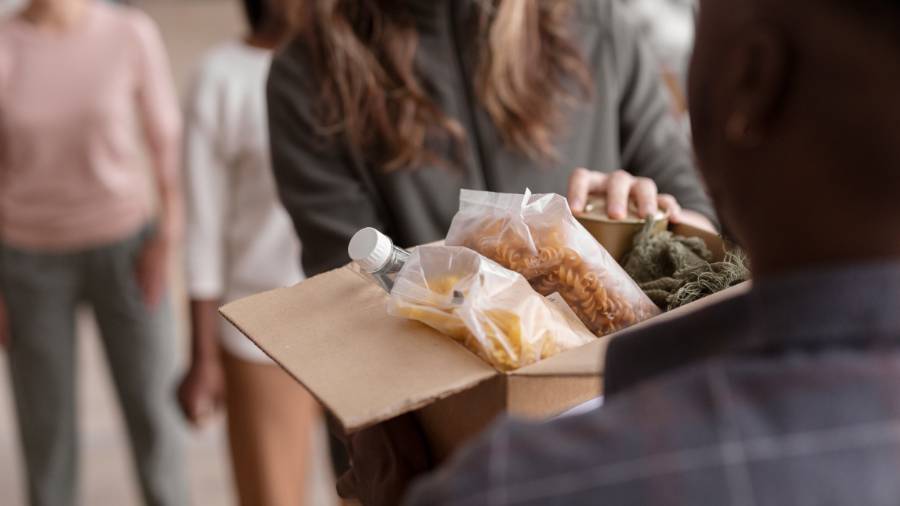
6. Donate items to charity or give them away
Donating unwanted items is a great way to clear the clutter, while benefitting charities and your local community. Here are some ways to give your stuff a second life:
- Charity shops: Donate clothes, books and household items to support good causes
- Animal shelters: Many animal shelters need old towels, blankets, pet toys and bedding. Check with your local shelter to see what they accept
- Community groups: Platforms like Freecycle or local Facebook groups are great for giving items directly to those in need
- Food banks: Clearing out the kitchen cupboards? Consider donating non-perishable, in-date food to your local food bank or supermarket collection point
- Friends and family: See if anyone close to you could use your items, whether it’s furniture for a friend moving house or baby clothes for an expecting family member
7. Repurpose, recycle or dispose of items responsibly
If you can’t sell or donate an item, it doesn’t need to go to waste.
Before you throw something away, think about whether it can be reused. For example, old clothes can be turned into cleaning cloths, wooden boxes or oil cans can become planters and glass jars could make handy storage containers.
If an item can’t be reused, check if it can be recycled instead of sending it to landfill. You can do this on:
- Recycle Now (England and Northern Ireland)
- Zero Waste Scotland (Scotland)
- Wales Recycles (Wales)
For anything that can’t be reused or recycled, make sure you dispose of it responsibly. Many councils offer special disposal services for electronics, hazardous materials like paint or bulky items such as furniture. Check with your local council to find the best way to get rid of these items without harming the environment.
8. Make decluttering a habit
To keep on top of things, make decluttering a regular habit. This means being more mindful of what you bring into your home and routinely selling, donating, recycling or responsibly disposing of unwanted items.
Set a schedule that works for you, whether it’s a quick declutter every few weeks, a more thorough clean-out every few months or an annual deep clean.
Remember, small, consistent efforts can prevent clutter from piling up and make decluttering feel less overwhelming. What’s more, regularly reviewing what you own and how you use it can help you appreciate the things you need and value.
Selling your unwanted items? We can help with that
Ready to send the items you’ve sold online? Your local Post Office branch offers plenty of ways to send parcels in the UK and around the world. Here’s how we can help:
- Royal Mail and Parcelforce Worldwide: Trusted for over 500 years, these services are available in all 11,500+ branches and offer UK delivery and international postage services. They have the lowest carbon footprint for UK parcel delivery, and offer guaranteed next-day delivery, tracking and signature services
- DPD services: Great for fast deliveries and market-leading in-flight delivery options, DPD track your parcel and send a photo when it’s been delivered. They give you a one-hour delivery window and deliver 99% of parcels on time
- Evri services: A budget-friendly delivery service, Evri also track your parcels and send a photo when it’s been delivered. They deliver 98% of parcels on time
- Drop & Go: This is a fast-drop service for regular senders. You can save time by dropping off parcels without waiting for each one to be weighed and labelled. Evri, DPD, Royal Mail and Parcelforce Worldwide are all available with Drop & Go. Check with your local branch to find out which services they offer
- Parcels Online: Save time by paying for postage online, then simply drop your items off at a local Post Office branch
- Easy parcel drop-off: If you've paid for postage within a selling platform app and used a courier service your local Post Office branch accepts too, drop them off whenever we're open and we'll send them for you
If you’ve sold items in person and received cash or cheques, you can deposit them at your local Post Office branch, which supports everyday banking for most UK accounts.
Key takeaways
- Clearing out clutter can help you create a more organised, stress-free home. Make extra cash by selling unwanted items online, rediscover lost belongings and give back to others
- The trick is to start small, decluttering one room at a time. Sort your items into four piles: sell, donate, recycle or repurpose or dispose of responsibly
- Sell unwanted items on platforms like Vinted, eBay, Depop, Facebook Marketplace or Amazon Marketplace. Clean your items, take high-quality photos, write clear descriptions and set a fair price. You can use your local Post Office branch to send your items in a variety of ways or drop them off if you've bought postage in the selling platform
- Donate to charity shops, animal shelters, food banks and community groups to give your items a second life and help others in need. If an item can’t be sold or donated, try to repurpose or recycle where possible
